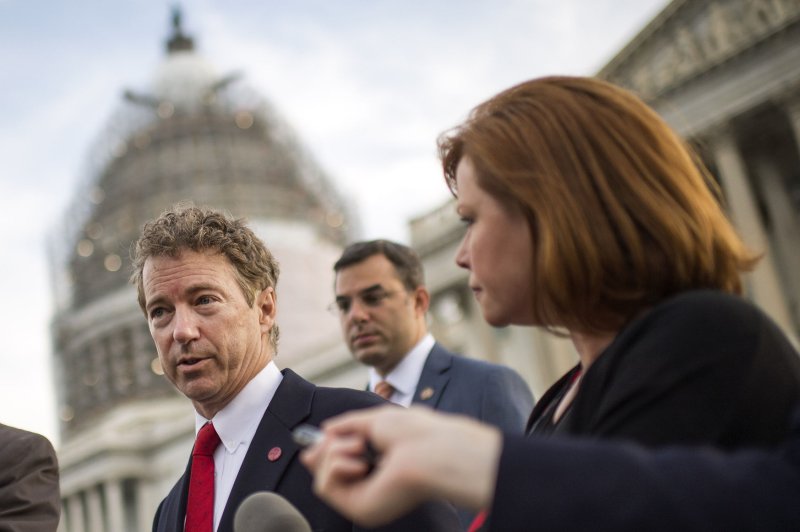1 of 7 | Sen. Rand Paul, R-KY, speaks to reporters after participating in a vote for the U.S.A. Freedom Act during a rare Sunday session on Capitol Hill in Washington, D.C. on May 31, 2015. Paul blocked a short-term extensions including the bulk collection of Americans' phone records, which are set to expire at midnight. The Senate voted 77-17 to take up the House-passed U.S.A. Freedom Act and will begin debate on the new government surveillance legislation. Photo by Kevin Dietsch/UPI |
License Photo
WASHINGTON, May 31 (UPI) -- The U.S. Senate, in a rare Sunday session, voted to advance the USA Freedom Act to replace the controversial Patriot Act -- largely as a means to restrict the widespread spying authority given to the National Security Agency.
The Senate voted 77-to-17 Sunday to begin debate on H.R. 2048, the USA Freedom Act, which has been passed by the House.
Lawmakers did not get it to President Barack Obama's desk by midnight, so there is a brief lapse between the expiration of the Patriot Act and the adoption of the Freedom Act.
The Senate defeated the bill last week, but agreed to take another look at the legislation as many recognized an extension of the Patriot Act didn't have enough support.
Senate Majority Leader Mitch McConnell, who led the charge against the Freedom Act last week, ultimately asked lawmakers to vote for it this time -- but only after a final plea for the Patriot Act's extension failed.
"I remain determined to working toward the best outcome for the American people possible under the circumstances," McConnell, R-Ky., said Sunday.
Taking much of the spotlight on the Senate floor Sunday was Sen. Rand Paul, R-Ky., who continued to promise the death of the NSA's spying powers. A candidate for president next year, Paul is making domestic liberties a main pillar of his campaign.
Paul said he planned to raise objections to every provision of the bill he sees as an unwarranted invasion of citizens' privacy.
McConnell's last plea Sunday asked colleagues to pass a two-week extension of the Patriot Act -- specifically so that terror suspects won't slip through the cracks during the lapse in law. When Paul refused, a spirited debate ensued between the Kentucky representatives.
"One of the promises given when the Patriot Act was originally passed was that, in exchange for allowing a less than constitutional standard, we would only use the actions against terrorists and against foreigners," Paul said. "We found, though, that 99 percent of the time, [it is] being used for domestic crimes.
"I believe that no section of the Patriot Act should be passed unless our targets are terrorists, and not Americans."
McConnell argued that "a campaign of demagoguery and disinformation" has allowed opponents of the Patriot Act to negotiate from a position of strength -- and the Senate from a position of weakness.
"This is where we are, colleagues. A House-passed bill with some serious flaws. An inability to get a short-term [Patriot Act] extension to try and improve the House-passed bill, in a way we would normally do this -- through some kind of consultative process," he said, moments before he asked for the Senate to vote in favor of the Freedom Act -- which he said the Senate will amend this week.
Paul has long been railing against the Patriot Act, and 10 days ago led a marathon 11-hour filibuster that prevented lawmakers from even addressing the law's renewal. On Sunday, he guaranteed "the Patriot Act will expire tonight."
Former Defense Department contractor Edward Snowden blew the whistle on the NSA last year by leaking classified documents to the media, which exposed the agency's massive dragnet on Americans' phone records.
That helped spark a debate on exactly what powers the Patriot Act truly authorizes -- and what it doesn't.
"Even the authors of the Patriot Act say that the [law] in no way gives authority to the president to collect all of your phone records all of the time," Rand said Sunday. "This is what we fought the Revolution over."
Perhaps the biggest change to the NSA's powers is that the new law would stop what some believe is a blank check to gather Americans' phone records under the guise of national security -- with very little supporting evidence required. The Freedom Act would put those records under the control of phone companies, where intelligence agencies can only get the data with an order from the Foreign Intelligence Surveillance Act court.
The NSA's claimed authority to collect phone records is one of three provisions of the Patriot Act that expired at midnight. The Freedom Act, if it becomes law, could take effect as early as Tuesday, Politico reported.















